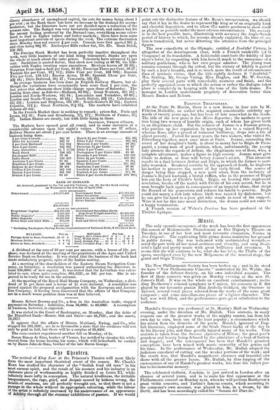S44 t 44attt5.
The revival of Sing Lear at the Princess's Theatre will most likely form the most important theatrical event of the season. Mr. Charles Kean has studied the character of the "foolish fond old man" in his most earnest spirit, and the result of his acumen and his industry is an elaborate piece of workmanship as highly finished as Louis XI, while infinitely more lofty in conception. The natural kindliness, the irritable temperament, the rage, grief, and despair caused by hidious wrong, the details of madness, are all perfectly wrought out, so that there is not a Passage in the whole without its appropriate colouring, while the labopr of the artist is infinitely increased by his maintenance of an appearance of debility through all the stormier exhibitions of paasion. If we would point out the distinctive feature of Mr. Bean's interpretation, we should say that it lay in the desire to represent -0(e king as of an originally kind and cheerful disposition, and to allow this native goodness to show itself as plainly as possible under the most adverse circumstances. The scenery is in the best possible taste, illustrating with accuracy the Anglo-Saxon period of history to which, for reasons already explained, the time of ac- tion is transferred, but never distorting the attention from the principal figures.
The new comedietta at the Olympic, entitled A Doubtful Victory, is altogether of the drawingroom class, with a French vaudeville (A la Campague) at its foundation. A fashionable aunt tests the fidelity of her niece's lover, by coquetting with him herself, much to the annoyance of a military gentleman, who is her own proper admirer. The young man remains constant through the ordeal, but the victory of fidelity is gained by such a hair's breadth, and is so much more the result of circumstance than of intrinsic virtue, that the title rightly declares it " doubtful." Mrs. Stirling, Mr. George Vining, Miss Hughes, and Mr. W. Gordon, play their several parts with remarkable neatness and finish, and the perfectly appointed room in which the action or rather the dialogue takes place is completely in keeping with the tone of the little drama. No manager in London understands propriety of decoration better than Messrs. Emden and Robson.
PARISIAN THEATRICALS.
At the Porte St. Martin, there is a new drame in four acts by M. Felicien Mallefille, an author who acquired considerable celebrity up- wards of twenty years ago, but has been of late somewhat in the shade. The title of the new piece is Lea Mere& Repenties ; the mothers in ques- tion being two women of humble origin, each of whom has given birth to an illegitimate child. But the seducer of Jeanne is a Russian prince, who patches up her reputation by marrying her to a ruined Boyard ; whereas Rose, after a period of transient brilliancy, drops into a life of abject poverty. Parted for many years, the two women, who visited St. Petersburg together, meet once more at Paris. Jeanne, concealing the secret of her daughter's birth, is about to marry her to Regis de Plou- gastel, a young man of good position, when, unfortunately, the young lady attracts the regards of Arthur, the illegitimate son of Rose, who, a complete adventurer, makes a figure in high society. Jeanne must give Cecile to Arthur, or Rose will betray Jeanne's secret. This situation results in a duel between Arthur and Regis, in which the former is mer- tally wounded. Rendered contrite by the approach of death, he implores his mother to preserve the secret of her early friend. One source of danger being thus stopped, a new peril arises from the inebriety of Jeanne's Boyard husband, a brutal ruffian, who in the presence of Regis lets out the facts of Cecile's birth. Regis, on hearing this unpleasant revelation, breaks off the match with Cecile of his own accord, but he is soon brought back again in consequence of an imperial ukase, that strips the Boyard of his possessions and reduces his family to poverty. Regis could not marry a rich lady whose birth was tainted by dishonour, but he can give his hand to a poor girl who stands in need of his support. Were it not for this nice moral distinction, the drama could not come to a happy termination. A French version of Weber's Preciosa has been produced at the Theatre Lyrique.


























 Previous page
Previous page